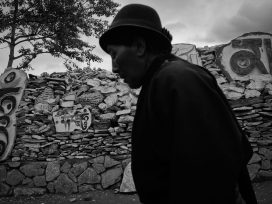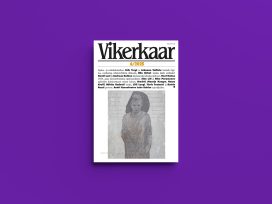Writing in 1999, ten years before Vaclav Havel’s death, his biographer John Keane imagined the scene of Havel’s funeral:
A whole nation would fall silent, and so too would admirers within many other nations – from the United States of America and Canada to Russia, Japan and China. […] his death would be a global media event – on a scale much bigger than the state funeral of Masaryk. As he lay in state in the old Castle of the Bohemian kings above the city, a queue some miles long would spring up. […] The day of the funeral would be a public holiday. Hundreds of thousands of people, dressed in black and clutching flowers, would be seen lining the route taken by the cortege on the way to his final resting place.”
Keane’s prediction would have been a neat literary ending to his best-selling biography were it not for the fact that Havel, the real-life political leader and public intellectual, was very much alive and had just been diagnosed with lung cancer.
 Yet Keane was right. Havel’s state funeral had a transformative effect on the Czech nation. Despite the decline of Havel’s domestic popularity over the last decade, Czech people across the land were genuinely moved by his untimely death. As Keane foresaw, Havel’s state funeral echoed that of the first Czechoslovak president, Tomas Garrigue Masaryk, in 1937. Back then, too, there were spontaneous scenes of public remembrance across the country. Fittingly, at the centre of the cortege was the very same horse-drawn gun-carriage that transported Masaryk’s remains. The government spared no effort and expense to make the funeral as dignified and imposing as is befitting for a national hero, who, as Vaclav Klaus put it, “did more than any other for the Czech Republic’s international position, prestige and authority in the World”.
Yet Keane was right. Havel’s state funeral had a transformative effect on the Czech nation. Despite the decline of Havel’s domestic popularity over the last decade, Czech people across the land were genuinely moved by his untimely death. As Keane foresaw, Havel’s state funeral echoed that of the first Czechoslovak president, Tomas Garrigue Masaryk, in 1937. Back then, too, there were spontaneous scenes of public remembrance across the country. Fittingly, at the centre of the cortege was the very same horse-drawn gun-carriage that transported Masaryk’s remains. The government spared no effort and expense to make the funeral as dignified and imposing as is befitting for a national hero, who, as Vaclav Klaus put it, “did more than any other for the Czech Republic’s international position, prestige and authority in the World”.
Political contradictions
Vaclav Havel was a highly unlikely hero. He was shy, elusive and at times difficult to understand; yet he inspired great respect as a playwright, dissident intellectual, political thinker and, perhaps most importantly, that rare phenomenon – “a philosopher president”. A larger-than-life figure, he was diminutive in appearance; a master of words, yet not a natural public speaker; seemingly uninterested in earthly achievements, in the end he acquired more political clout and international recognition than any Czech politician of his generation.
He appeared to have pursued conflicting political agendas. The spiritual architect of the 1989 non-violent revolution became one of the strongest proponents of the NATO expansion in 1998-1999, the US-led military intervention in Kosovo in 1999 and the invasion of Iraq in 2003. Havel’s enthusiasm for European integration was tempered by his wariness of the dangers of the EU’s excessive reliance on bureaucratic structures, which appeared to be growing out of control. While acknowledging the EU’s achievements, he worried that Europe’s true spirit – its fundamental commitment to freedom, the protection of human rights and basic human decency – was increasingly “hidden behind the mountains of systemic, technical, administrative, economic, monetary and other measures that contain it”.
It is little wonder, then, that Havel invited misunderstandings. Leftwingers in the West felt betrayed when he became a champion of NATO expansion and a reluctant advocate of the free market. The Slovenian philosopher, Slavoj Zizek, who has attained cult status by making Leninism sexy for the twenty-first century, wrote that “there is no escape from the conclusion that [Havel’s] life has descended from the sublime to the ridiculous “. More recently, a commentator in The Guardian accused Havel of having failed to acknowledge “the positive achievements of the regimes of eastern Europe in the fields of employment, welfare provision, education and women’s rights”.
Conversely, rightwingers – most notably Vaclav Klaus – mistrusted Havel’s proclivity to muse about the need for a radical transformation of individuals and their societies; his relentless desire for a true existentialist revolution that would make this a better world. The Czech philosopher Vaclav Belohradsky, who alongside Jan Patocka influenced Havel’s thinking about politics before 1989, became a fierce critic of Havel’s “anti-political” politics after 1989. Though Belohradsky remained respectful of Havel’s political courage as a dissident, he dismissed his later preoccupation with lofty visions for our planet as the “politics of kitsch”.
Ridicule and admiration
Havel’s extraordinary life story gave rise to adulation and ridicule in equal measure. Eda Kriseova was probably the first author to stylise Havel’s life into a pleasing story in which good prevails over evil. Her authorised biography, published just after the Velvet Revolution of 1989, borders on hagiography, introducing Havel as a fearless young man who – addressing the Czechoslovak Writers’ Union in 1956 – “looked like an angel”, speaking the truth to the powerful. Comparing Havel to Franz Kafka, and highlighting their fascination with the absurdity of the human predicament, she pointed out that Havel was born into a world that was in such disarray that it could only have improved. As she put it, “Kafka’s nightmare became reality. Havel’s dream is becoming reality”. Kriseova also presented Havel as a modest, reluctant leader who had to be forced to accept the Czechoslovak presidency.
Keane’s biography presents a more nuanced picture, notwithstanding its numerous shortcomings. It demonstrates, for example, that Havel was far less reticent to assume political power than his popular image suggested. Yet, just as Kriseova went overboard with her celebration of the “philosopher-king”, Keane went too far in misconstruing Havel as a ruthless manipulator who betrayed his earlier ideals once he was seduced by the temptations of power.
Neither biography did justice to Havel as a dissident, a politician, a playwright and a profoundly influential public intellectual. They didn’t because they couldn’t. Can anyone do justice to a life that is so much like a fairy-tale, in which a lonesome figure with his dogged determination to do the right thing prevails against all odds to become a celebrated leader of a free nation? Paraphrasing Adam Michnik, one could say that Havel’s story was “like a bad American film, because it has a happy ending”. Havel himself was puzzled. As he wrote in a rather idiosyncratic attempt at an autobiography:
To tell you the truth, it’s not just Americans and other foreigners who think of me as a kind of fairy-tale prince or at least as the main character in a fairy tale; I too am often aware of something utterly unbelievable in my own destiny. And I’m less and less able to understand that destiny; at times I even see myself as a minor freak of history. […] And so I must ultimately pose the question as to whether all of this – the fact that such a peaceable man ended up living such an adventurous life – isn’t a result of the fact that life itself, even the most ordinary and inconspicuous life, is an unbelievable miracle? A fairy tale at times beautiful, at times suspenseful, at times terrifying.”
Truth be told, even Havel didn’t live up to the challenge of writing his own story. Though the book contains some amazingly candid insights into Havel’s inner world and his many insecurities, the somewhat random collage of diary entries, interspersed by a lengthy, disjointed interview and snippets from his notes during his presidency, is ultimately disappointing. The book reads like a lengthy and at times rather embarrassing justification of his inability to write. It is a poor echo of its predecessor, Disturbing the Peace, a book that gives one of the best accounts of the dilemmas that dissidents like Havel had to face in Central Europe in the 1970s and 1980s.
Consistency amidst change
To do justice to Havel’s legacy it might be best to ignore purely biographical writings, whether they come from Havel, Keane, or Kriseova, and focus instead on his literary output and key political writings. Their close reading reveals that there is far less inconsistency in Havel’s decisive political actions throughout his life than is often assumed.
Fundamentally, Havel was a man of ideas; an accomplished playwright who was pushed into the political sphere by taking his own ideas seriously and attempting to live up to them. This is what Havel termed “living in truth”. Confronted as he was by the hypocrisies that characterised the daily life of Czechoslovak citizens after the defeat of the Prague Spring in 1968-69, Havel was convinced that maintaining moral integrity was not a choice but a necessity. If there is an identifiable motif that informed all his political actions, it was his firm belief that one must pursue “politics as practiced responsibility for the world, not as mere technology of power”.
Havel might have been a better playwright, president and public intellectual than a philosopher. But philosophers understood Havel’s ideas and his life better than anyone. By far the best book about Havel was written by a political philosopher, James F. Pontuso, who paid attention to both Havel’s political thinking – displayed in his plays, correspondence, essays and numerous speeches – and as his political actions in equal measure. In all his conflicting roles, according to Pontuso,
[Havel] has exhibited extraordinary determination, originality, irony, and humour. What was perhaps even more impressive was Havel’s dedication to the principle of individual responsibility. Havel’s greatness resides in his being a spokesman for, and an exemplar of, the highest and therefore the most difficult kind of moral behaviour”.
To be sure, Havel changed after 1989. Havel the president acted differently from Havel the dissident intellectual. But he remained more truthful to himself than many of his critics recognized. As a political thinker, Havel was always suspicious of abstract ideals. It is for this reason that he became such an astute critic of all political ideologies, unforgettably discussed in his influential essay, “The Power of the Powerless”. Havel understood as well as anyone that principled moral actions do not always bring about the desired results. Reflecting on the activities of the Charter 77 movement in communist Czechoslovakia, he argued that defying repression was always meaningful:
Living within the truth, as humanity’s revolt against an enforced position, is … an attempt to regain control over one’s own sense of responsibility. In other words, it is clearly a moral act, not only because one must pay so dearly for it, but principally because it is not self-serving: the risk may bring rewards in the form of a general melioration in the situation, or it may not.”
It was one of many surprising ironies of Havel’s life that he managed to reap the rewards of his dissident activities. His life changed dramatically, but his key commitments remained the same. The fact that he recognised and accepted that the role of a democratically elected president is different from a dissident intellectual in a repressive regime speaks to the greatness of Havel as a politician. Although he adjusted his actions to the practical challenges brought about by the Czech presidency, he continued to advocate larger worthwhile causes. For example, though Havel was highly suspicious of all institutions, he was able and willing to accept the ceremonial role endowed on him by the Czech presidency.
While Havel the dissident proved his political courage by maintaining his uncompromising opposition towards the communist regime, Havel the president proved his political wisdom by accepting the necessity of making compromises as the bread and butter of daily politics. He did so with imagination that helped to give new meaning to a political office that was deservedly suspect. His innovations ranged from seemingly trivial issues – he commissioned a new design for the costumes of the presidential guard in the castle – to bold symbolic gestures, such as confronting Czech society with the injustice of the post-war war expulsion of Germans.
A philosopher king Havel was not. The Czech presidency did not even entail enough power to make that possible. But if there ever was something like the “king of all dissidents”, Havel was it. No other active head of state has done more than Havel for those who have been politically persecuted – often at considerable political cost. Whether he was calling for more political freedom in Burma (he nominated Aung San Suu Kyi for the Nobel peace prize), supporting human rights activists in Belorussia, Cuba or Ukraine, his voice was heard.
His inspirational actions found resonance well beyond the reach of a small country. It is often said that the problem in Russia has been that it does not have its own Havel. It has always had Havel’s support though. One of the very last public interventions that Havel made through his writing was a contribution he wrote for the major Russian opposition newspaper Novaya Gazeta. It was only published after Havel’s death. As the newspaper commented, Havel was “hurrying to tell people something very important. He succeeded – read it.” In the short article, Havel urged his Russian counterparts to continue in their struggle for “basic rights and liberty”; a struggle that can only succeed if more and more people get involved in it. Echoing his argument in the “Power of the powerless”, Havel argued that “the most serious danger for Russia is people’s indifference and apathy”.
Dreamer and pragmatist
One of the most significant lessons of Havel’s life may well be that living within the truth can pay off after all. Acting in defiance of the prevalent wisdom – whether as a dissident in normalized Czechoslovakia, or as a president meeting the Dalai Lama – may, in the end, have been the pragmatic choice.
Does this capture Havel’s legacy? Of course not. Nietzsche’s despair at the inadequacy of his “written and painted thoughts” was something Havel the philosopher and writer understood all too well. On 11 December 2005, he wrote:
The beauty of language is that it can never capture precisely what it wants. Language is disconnected, hard, digital as it were, and for that reason, it can never completely capture something as connected as reality, experience, or our souls. This opens the door to the magnificent battle for self-expression that has accompanied man down through history. It is a battle without end, and thanks to it, everything that is human is continually being elucidated, each time somewhat differently. Moreover, it is in this battle that man in fact becomes himself. As an individual and as a species. He simply tries to capture the world and himself more and more exactly through words, images, or actions, and the more he succeeds, the more aware he is that he can never completely capture himself, nor any part of the world. But that drives him to keep trying, again and again, and thus he continues to define himself more and more exactly. It’s a Sisyphean fate. But it can’t be helped: man will carry the complete truth about himself to the grave.”







